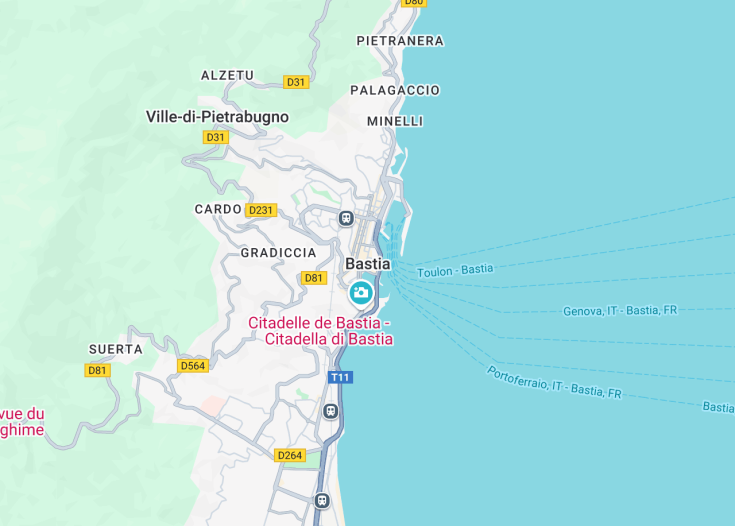Nestled on the northeast shore of Corsica, Bastia is a captivating port city steeped in history, characterized by its baroque churches, crumbling citadellu, and the bustling Vieux Port. Aromatic markets and narrow azure lanes converge in this sun-drenched Mediterranean haven, offering an enchanting escape from the mundane. A backdrop of soaring mountains complements the crystal blue waters, sketching the landscape of an unforgettable Corsican adventure.
Explore the Terra Vecchia district in the morning to enjoy the vibrant markets before the afternoon rush, leading to a more relaxed shopping experience.
Don’t miss a scenic drive along the Cap Corse peninsula; the dramatic coastline and quaint fishing villages offer some of Bastia’s most spectacular views.
Top things to do & see in Bastia
Select the following sights and activities to discover best tickets and tours available in Bastia.
Bastia: The Cultural Jewel of Corsica
| Country | Corsica (France) |
| Time in Bastia | GMT+1 |
| Language spoken | French |
| Population | 47,000 (source: INSEE, 2021) |
| Currency | Euro (€, EUR) |
| Airports |
|
Bastia, the charming port city on the northeast coast of Corsica, exudes a unique blend of historical grandeur and vibrant modern life. Rooted deeply in its Genoese past, Bastia’s old town mesmerizes visitors with its labyrinth of narrow lanes and opulent baroque churches. The city’s bustling economy thrives from both its vibrant tourism and as the island’s major port, connecting Corsica to France and Italy.
The old harbour, or Vieux Port, is the heart of Bastia, surrounded by brightly colored buildings with lively terraces overlooking the mooring boats. This picturesque setting is one of the city’s iconic photographers’ paradises. Overlooking the port, the imposing Citadel of Bastia with its ancient walls offers spectacular views and hosts the historic Palais des Gouverneurs. The city is also known for its vibrant markets, where locals and visitors alike explore Corsican crafts, produce, and spices.
Another highlight of Bastia is the annual Festivoce, which celebrates Corsican music and culture. This festival draws performers and audiences from all over the world, adding to the city’s rich cultural tapestry. Additionally, Bastia is renowned for its gastronomy, featuring unique Corsican flavors, and wines, with numerous eateries offering locally sourced ingredients and traditional dishes.
Whether it’s exploring historic sites, enjoying a leisurely stroll along the marina, or indulging in the local cuisine, Bastia offers a captivating experience that uniquely reflects Corsican culture, making it a must-visit destination for those seeking an authentic Mediterranean escape.
Where is Bastia?
Bastia is located on the northeastern coast of Corsica, France, bordered by the Tyrrhenian Sea to the east.
Distances:
| Route | Distance by car | Time by car |
|---|---|---|
| Ajaccio to Bastia | 91 miles (147 km) | 2 hours 30 minutes |
| Calvi to Bastia | 68 miles (110 km) | 1 hour 45 minutes |
| Porto-Vecchio to Bastia | 94 miles (151 km) | 2 hours 35 minutes |
What is Bastia famous for?
Bastia is renowned for its rich history, beautiful scenery, and vibrant culture. It is a gateway to the island of Corsica, boasting a stunning old port, picturesque avenues lined with palm trees, and a diverse array of historical and cultural attractions.
History
Prehistoric to Medieval Times
The area now known as Bastia has been inhabited since prehistoric times, as evidenced by archaeological finds in the region. By the Middle Ages, the site was known as a fishing village, primarily under the control of the Genoese government from the 14th century. It was the Genoese who erected the original fort (bastiglia) that gave Bastia its name.
14th Century – 18th Century
Bastia grew substantially under Genoese rule, becoming an important port by the 16th century. Its strategic location meant that it played a crucial role in trade and defense in the Mediterranean. Numerous churches and buildings from this era still stand, reflecting the wealth and importance of Bastia during this time.
19th Century to Present
With the decline of Genoese power, Corsica was ceded to France in 1768, and Bastia became an important military and administrative center under French rule. In the 19th and 20th centuries, it continued to thrive as a port city, with its economy bolstered by wine production and trade. Today, Bastia is recognized for its rich history, preserved old port, and vibrant culture, making it a prominent face of Corsican heritage.
Visit Bastia
What to see and do in Bastia, Corsica (France)
Explore the vibrant streets of Bastia, rich in history and culture. Key attractions include:
- The Vieux Port (Old Port), festooned with colorful boats and lined with quaint eateries.
- St. Nicholas Square, the largest square in Corsica, surrounded by charming outdoor cafes.
- The Governor’s Palace Museum, offering insight into Corsica’s tumultuous history.
- The Church of St. Jean Baptiste, towering over the Terra Vecchia district.
Moreover, take time to stroll along the Genoese citadel, soaking in panoramic views of the Mediterranean.
Festivals and Events in Bastia
Each year, Bastia comes alive with numerous events and festivals. Notably:
- The Bastia Carnival, held in spring, fills the streets with parades and vibrant displays.
- Creuza de Má, a summer music festival, showcases Mediterranean folk music.
These events offer a deep dive into the local culture, drawing visitors from around the globe.
Best time to visit Bastia
The optimal time to visit Bastia is between May and September when the weather is warm, allowing for ample enjoyment of outdoor activities and local festivals.
Is Bastia worth visiting?
Bastia is certainly worth visiting for anyone interested in exploring a city that beautifully marries its historical past with the vibrancy of present-day Corsican culture. From its picturesque old port and stunning architectural landmarks to the engaging local festivals, Bastia offers a unique and enriching experience that captures the essence of the Mediterranean life.










